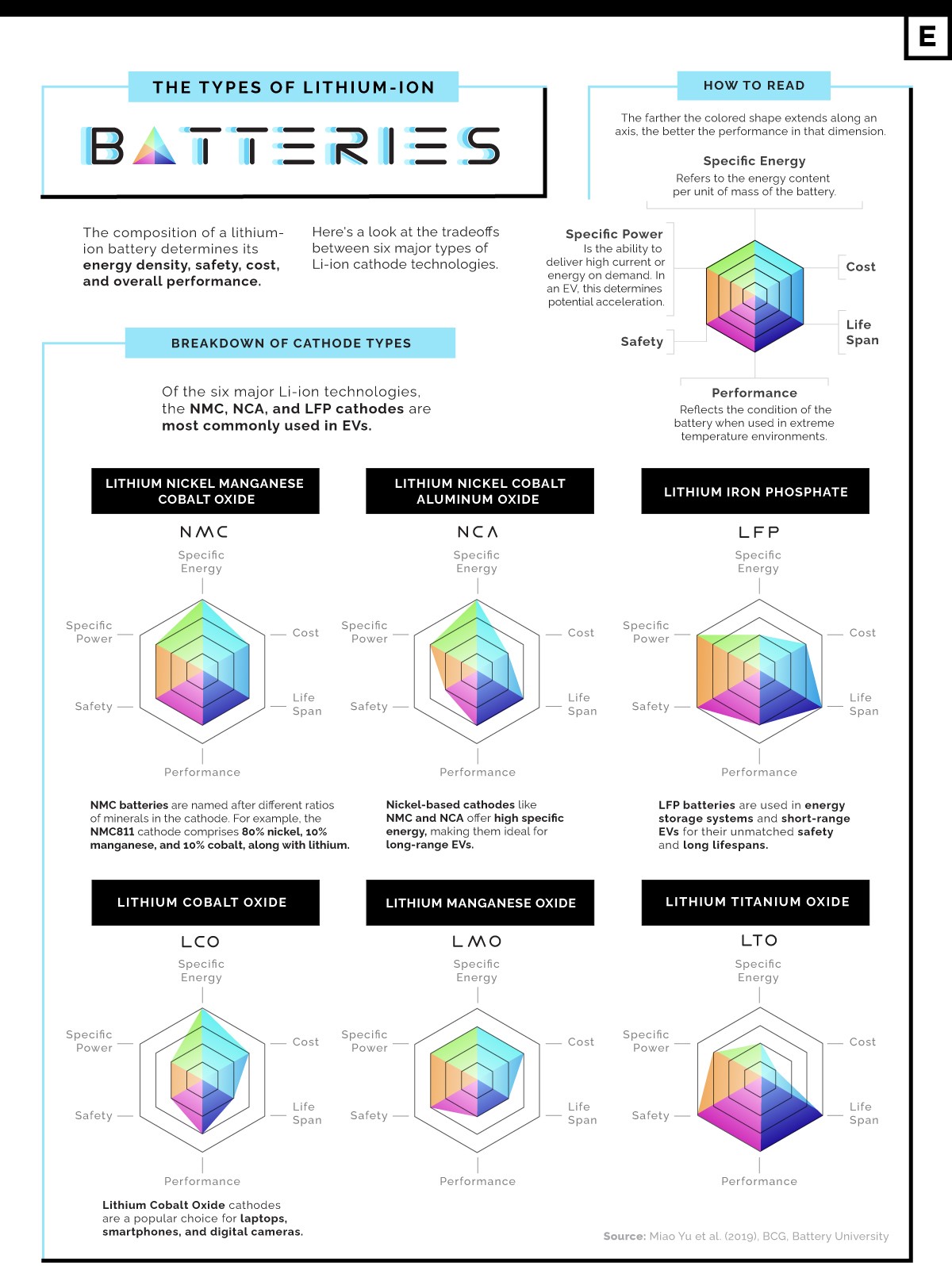Do you know the Types Of Lithium Ion Batteries Used In Electric Vehicles?
Lithium-ion batteries are prevalent nowadays. They are used in almost all cell phones, laptops, and even Electric vehicles.
However, the types of lithium ion batteries used in Electric Vehicles differ from those used in other devices.
This article discusses the different Types Of Lithium Ion Battery Used In Electric Vehicles. So, let’s get into it.
Introduction To Types Of Lithium Ion Batteries in Electric Vehicles
Lithium-ion batteries have become integral to our daily lives, powering everything from smartphones to electric vehicles (EVs).
Their history dates back to the 1970s, when they were first developed by M. Stanley Whittingham, John Goodenough, and Akira Yoshino.
These batteries gained popularity due to their high energy density, lightweight nature, and rechargeable capabilities.
Lithium-ion batteries are crucial for electric vehicles. They are the primary energy storage solution for EVs, providing the necessary power to drive the vehicle.
As the world shifts towards sustainable transportation, the demand for efficient and reliable lithium-ion batteries for electric vehicles continues to grow.
Types of Lithium Ion Batteries Used in Electric Vehicles

Lithium Iron Phosphate (LiFePO4) Batteries
Lithium Iron Phosphate (LiFePO4) batteries are known for their high thermal and chemical stability, making them a safe and reliable option for electric vehicles.
They have a longer lifespan than other lithium-ion batteries and are less prone to thermal runaway, which is crucial for ensuring the safety of EVs.
LiFePO4 batteries also have a higher tolerance for overcharging and over-discharging, making them suitable for high-performance applications.
LiFePO4 batteries are commonly used in electric vehicles for their stability and safety features. They are preferred for heavy-duty applications such as buses and trucks, where safety and longevity are paramount.
LiFePO4 batteries have a lower energy density than other lithium-ion batteries but excel in safety and cycle life.
Lithium Nickel Manganese Cobalt Oxide (NMC) Batteries
Lithium Nickel Manganese Cobalt Oxide (NMC) batteries are known for their high energy density and improved power capability.
NMC batteries balance high energy density and power output, making them suitable for electric vehicles that require long-range and high performance. They also exhibit good thermal stability and have a relatively long lifespan.
NMC batteries are widely used in electric passenger cars and other light-duty vehicles. Their high energy density allows for longer driving ranges, making them popular for mainstream electric vehicles.
Compared to other lithium-ion batteries, NMC batteries offer a good balance of energy density, power output, and longevity.
Lithium Nickel Cobalt Aluminum Oxide (NCA) Batteries
Lithium Nickel Cobalt Aluminum Oxide (NCA) batteries are known for their high energy density and excellent power capability.
NCA batteries are commonly used in vehicles that prioritize range and performance, such as high-end electric cars.
They offer high specific energy, allowing for extended driving ranges and exhibiting good thermal stability.
NCA batteries are favored in electric vehicles for their high energy density, which enables long driving ranges and fast acceleration.
NCA batteries are commonly used in premium electric vehicles, where performance is a key consideration.
Compared to other types of lithium-ion batteries, they offer a higher energy density but may have a slightly lower cycle life.
Lithium Titanate (LTO) Batteries
Lithium Titanate (LTO) batteries are known for their exceptional cycle life, fast charging capabilities, and high power output.
They are designed for applications that require frequent charging and discharging, making them suitable for electric vehicles.
LTO batteries also exhibit excellent thermal stability and are considered to be one of the safest options among lithium-ion batteries.
LTO batteries are used in electric vehicles, buses, trucks, and other heavy-duty applications where fast charging and long-term reliability are crucial.
Their ability to withstand thousands of charge-discharge cycles makes them ideal for demanding use cases.
Compared to other types of lithium ion batteries, LTO batteries offer a lower energy density but excel in terms of cycle life and fast charging capabilities.
Factors to Consider When Choosing The Types Of Lithium Ion Batteries for Electric Vehicles
When selecting the types of lithium ion batteries for electric vehicles, several factors need to be taken into account:
- Energy density and range: The battery’s energy density directly impacts the electric vehicle’s driving range. Higher energy density batteries can provide longer driving ranges.
- Safety and thermal stability: Ensuring the safety of the battery pack is crucial for electric vehicles. Batteries with good thermal stability and safety features are preferred to mitigate the risk of thermal runaway.
- Cost and longevity: The cost of the battery pack and its expected lifespan are important considerations for electric vehicle manufacturers and consumers.
- Environmental impact and sustainability: The environmental impact of the battery, including its manufacturing process and end-of-life disposal, is an increasingly important factor in the selection of lithium-ion batteries for electric vehicles.
The Future of Lithium-Ion Batteries in Electric Vehicles
Lithium-ion batteries for electric vehicles are expected to undergo significant developments as technology advances.
Researchers and manufacturers are exploring new materials and designs to improve lithium-ion batteries’ energy density, lifespan, and safety.
Additionally, the potential for new types of lithium-ion batteries, such as solid-state batteries, holds promise for further enhancing the performance of electric vehicles.
Advancements in lithium-ion battery technology have the potential to revolutionize the electric vehicle industry and contribute to sustainability efforts.
As the demand for electric vehicles continues to rise, the development of more efficient and sustainable lithium-ion batteries will play a crucial role in shaping the future of transportation.
Conclusion: Types Of Lithium Ion Batteries
In conclusion, the types of lithium ion batteries used in electric vehicles vary in their characteristics, advantages, and applications.
Choosing the right battery for electric vehicles involves considering energy density, safety, cost, and environmental impact.
As the automotive industry continues to embrace electric vehicles, the development of advanced lithium-ion batteries will be pivotal in driving the adoption of sustainable transportation and shaping the future of mobility.